&gamma determination from B → D(*)K decays from BaBar
We present here the bound on γ coming from the experimental measurements from
BaBar experiment only.
We use the following experimental inputs
|
DK (GLW)
|
ACP+ = 0.35 ± 0.14
|
ACP- = -0.06 ± 0.15
|
RCP+ = 0.90 ± 0.13
|
RCP- = 0.86 ± 0.11
|
|
D*K (GLW)
|
ACP+ = -0.10 ± 0.23
|
|
RCP+ = 1.06 ± 0.28
|
|
|
DK* (GLW)
|
ACP+ = -0.08 ± 0.21
|
ACP- = -0.26 ± 0.42
|
RCP+ = 1.96 ± 0.41
|
RCP- = 0.65 ± 0.27
|
|
DK(*) (ADS)
|
experimental likelihood from BaBar
|
|
D*K(ADS)
|
AADS = -0.22 ± 0.63
|
RADS = 0.046 ± 0.032
|
|
DK, D->Kpipi0 (ADS)
|
experimental likelihood from BaBar
|
|
DK
|
Dalitz BaBar
|
hep-ex/0607065,hep-ex/0507002
|
|
DK
|
x+= -0.07 ± 0.06
|
x-= 0.04 ± 0.06
|
y+= -0.03 ± 0.07
|
y-= 0.06 ± 0.07
|
|
|
D*K
|
x+= 0.08 ± 0.09
|
x-= -0.11 ± 0.09
|
y+= 0.10 ± 0.12
|
y-= -0.02 ± 0.10
|
|
DK*
|
x+= -0.07 ± 0.27
|
x-= -0.20 ± 0.23
|
y+= -0.01 ± 0.37
|
y-= 0.26 ± 0.34
|
where the quantities x± and y± are defined in terms of r, γ and δ as x± = r • cos(δ ± γ) and
y± = r • sin(δ ± γ). Additional care has to be taken in the case of DK*: Because of the presence
of a non-resonance component, all the previous formulas have to be changed in this case,
replacing all the r factors appearing linearly with r • κ, being κ a factor depending in principle
by the cuts applied in each analysis. The effect was found to be small by BaBar GLW analysis, which
also includes a systematic contribution to it. Because of that, we identify the κ factor of
the GLW analysis with that one of the Dalitz measurement, since the difference is covered by such
systematic effect.
Distributions from UTfit
We translated these constraints in terms of a bound on
(ρ ;
η) plane
generating r and rDCS in the range [0,1] and the
strong phases in [0,2π].
We show the distribution of γ and the corresponding effect on the
(ρ ;
η) plane:
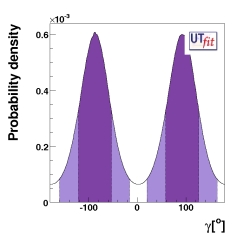
(EPS), [JPG]
|
γ distribution from DK, D*K and DK*
with present measurements from BaBar using all the methods.
|
|
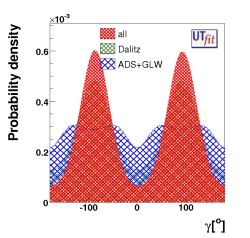
(EPS), [JPG]
|
comparison of total γ distribution from DK, D*K and DK*
(BaBar only) to Dalitz and ADS+GLW methods alone
|
|
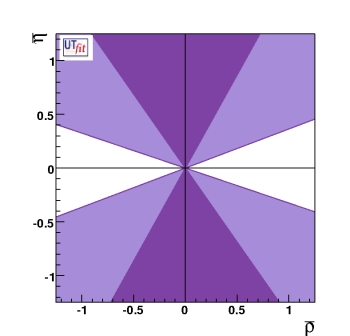
(EPS), [JPG]
|
bound from B → DK, D*K and DK*
decays with present measurements from BaBar using all the methods.
|
|
γ = 92 ± 34 ([20,164] @ 95% CL)
γ = -88 ± 34 ([-161,-16] @ 95% CL)
|
We also show the distributions of the parameters r for all the modes used
(DK, D*K and DK*), together with the 2-dimensional plots of
r vs γ:
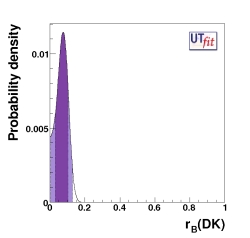
(EPS), [JPG]
|
r distribution from DK with
present measurements using all the methods.
|
|
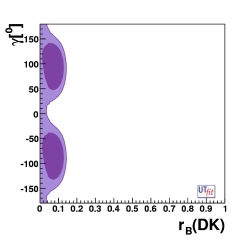
(EPS), [JPG]
|
distribution of rDK vs γ
using all the methods
|
|
rDK = 0.067 ± 0.035 ([0.004,0.129] @95% CL)
|
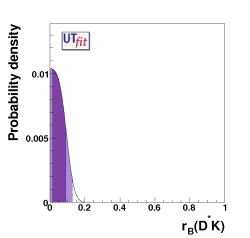
(EPS), [JPG]
|
r distribution from D*K decays with
present measurements from BaBar using all the methods.
|
|
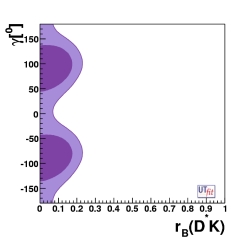
(EPS), [JPG]
|
distribution of rD*K vs γ
using BaBar measurements with all the methods
|
|
rD*K = 0.053 ± 0.038 ([0.002,0.132] @95% CL)
|
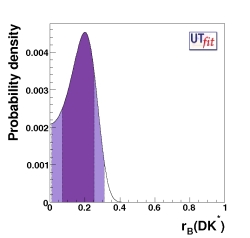
(EPS), [JPG]
|
r distribution from DK* decays with
present measurements from BaBar using all the methods
|
|
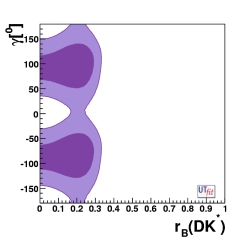
(EPS), [JPG]
|
distribution of rDK* vs γ
using BaBar measurements with all the methods
|
|
rDK* = 0.16 ± 0.09 ([0.01,0.31] @95% CL)
|
